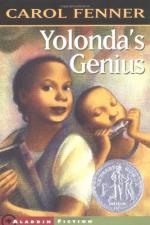
|
| Name: _________________________ | Period: ___________________ |
This test consists of 5 short answer questions, 10 short essay questions, and 1 (of 3) essay topics.
Short Answer Questions
1. How does Yolanda feel about Aunt Tiny's proposal?
2. Why are there security guards around the stage area?
3. Where is Yolanda's family going for a visit?
4. What does Yolanda snack on during the car trip?
5. What does Yolanda think might be her reward for bravery?
Short Essay Questions
1. What does Aunt Tiny do for a living, and how does that help Yolanda's family?
2. What "epiphany" does Yolanda have when she is at the park?
3. What happens when Momma finally notices Andrew's new harmonica?
4. Why does Yolanda send Shirley away in a cruel manner?
5. Why is Yolanda unable to listen as the concert opens?
6. Why doesn't there seem to be any way back stage?
7. What does Yolanda do when she sees two female security guards?
8. How do Yolanda and Andrew play in their concert for Aunt Tiny and Yolanda's momma, and how do the two women respond to the performance?
9. What does Momma say in reply to Yolanda saying Andrew is a genius and needs a special school?
10. Why does Yolanda volunteer to reserve her family's seats for the concert that evening?
Essay Topics
Write an essay for ONE of the following topics:
Essay Topic 1
Discuss one of the following:
1. Thoroughly analyze how the setting informs the plot in "Yolonda's Genius".
2. Trace and analyze one major theme of "Yolonda's Genius". How is the theme represented by symbolism? By the characters' behaviors? By the action?
3. Trace and analyze two secondary themes of "Yolonda's Genius". How are the themes represented by symbolism? By the characters' behaviors? By the action?
Essay Topic 2
Understanding the setting, both the place and time, helps the reader to enjoy a novel. Discuss the following:
1. Research Chicago and Grand River, Michigan in the early 21st century, and write an informative essay about the social and geographical aspects.
2. Research the way drug pushers lure children to use drugs and write an informative essay about the situation and offer one or more solutions.
3. Compare/contrast the life of Yolanda in Chicago, IL and then Grand River, MI to your life when you were eleven.
Essay Topic 3
Yolanda is eleven throughout much of the novel. Discuss the following:
1. What are some ways that Yolanda seems like an average eleven year old? Give examples and why you say her activities are average teen activities.
2. What are some ways that Yolanda seems older than her age of 11? Give specific examples and discuss whether they seem consistent with the character of Yolanda as she is developed throughout the book.
3. Do you think most eleven year old girls would look out for their six-year-old brother in the ways Yolanda does? Why or why not.
|
This section contains 996 words (approx. 4 pages at 300 words per page) |

|




